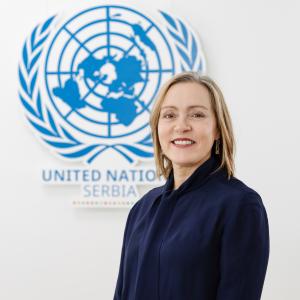Dear Excellencies, ministers, colleagues, and partners,
Dobro jutro svima.
I am very pleased to be here today — and to be part of a conversation that brings together the people and institutions shaping Serbia’s green future.
We meet at a time when environmental sustainability is no longer an option or a slogan. It is a condition for long-term development, economic resilience, and social stability. Science is clear on the need for humanity to act, more rapidly and with more ambition.
Serbia has already taken important steps in this direction. The 2021 green bond — €1 billion raised, with nearly 90% allocated to green infrastructure — was a bold financial commitment. The country has also advanced in aligning with the EU Green Agenda and building national strategies for climate and environmental protection.
The next challenge is consistency: translating policy into impact — across sectors and across time.
The United nations work in Serbia focuses not only on technological and financial aspects of this green transition, but on how it can be done in a way that is fair, inclusive, and benefits women and men equally.
We support national institutions with data and policy expertise — but we also work at the local level: with municipalities, with youth, and with the private sector.
One key area is ESG. Together with partners, we have supported micro and small enterprises in Serbia to understand and apply ESG principles — through tailored toolkits, workshops, and one-on-one advisory support. Small and Medium sized Enterprises have already taken part in pilot sessions to build the skills and knowledge they need to meet EU expectations — including the Taxonomy and the Corporate Sustainability Reporting Directive.
This is not a box-ticking exercise. It is about helping businesses operate more transparently, attract investment, and compete on evolving markets.
We are also helping unlock green finance — supporting companies with technical guidance to prepare solar and energy efficiency projects, and offering innovation vouchers to develop circular economy solutions.
A great example is the Circular Communities initiative, led by UNDP, the Ministry of Environmental Protection with the support of the Global Environment Facility. It selected 21 local projects — from converting bio-waste into energy, to developing biodegradable products, to using AI for pollution control. Nine of these received funding, and 12 more were supported through research-business collaboration.
This initiative is part of a broader UN portfolio on environment in Serbia — with agencies like UNOPS, FAO, and UNEP also contributing in their respective areas of expertise.
Large companies are also getting involved. Coca-Cola HBC, Belgrade Airport, and Yettel joined the “Accept Circular Challenge,” publicly committing to reduce resource use and shift toward circular models.
These efforts reflect a broader global push. In August, countries will come together to negotiate a plastic treaty, that will address the full life cycle of plastics and help countries transit to circular economy.
Across the world, the United Nations is supporting countries to transition toward low-carbon, climate-resilient economies — through better policy, better finance, and stronger institutions. We are seeing the urgency — but also the solutions — from Kigali to Kragujevac, from small islands to major capitals. The opportunities for action are innumerable.
In Serbia, as we will hear in today’s panels, there is a growing community of young people, entrepreneurs, and innovators who are not waiting for change — they are leading it.
This is why we speak of green transition not as a burden, but as an opportunity:
An opportunity to grow differently. To invest with care. To innovate with purpose.
The UN remains a committed partner on this journey — to help translate ambition into results, and policy into long-term progress.
Thank you. Hvala vam.








